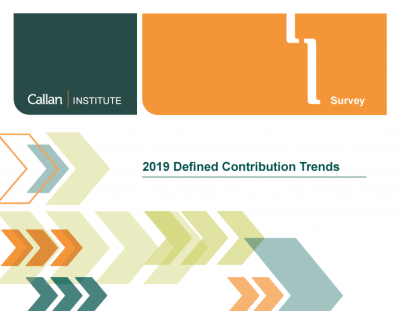Defined contribution plan sponsors are continuing their intense scrutiny of fees, according to Callan’s 2019 Defined Contribution Trends Survey, while also adding participant communication and financial wellness as top priorities for this year.
As part of the focus on participants’ financial well-being, the Callan survey found a significant increase in the number of plans offering forms of investment help, with guidance jumping from 39% in 2016 to 89% in 2018, and on-site seminars increasing from 43% to 76% over the same period.
Callan has published the annual DC Trends Survey since 2007. This year’s survey includes responses from 106 plan sponsors, including both Callan clients and other organizations, with 86% of them offering a 401(k) as their primary DC plan and 62% having more than $1 billion in assets. Notably, this year’s survey does not include government plans, which will be the focus of a separate survey later this year. Responses were collected in September and October of 2018.

Callan’s survey is designed to provide a benchmark for sponsors to evaluate their plans compared to peers, and to offer insights to help sponsors take steps to improve their plans and the outcomes for their participants.
Other highlights from this year’s survey:
FEES: In addition to the overall focus on plan fees, the DC Survey highlighted some specific areas of change and focus for plans.
- More than 75% of sponsors calculated their DC plan fees within the past 12 months in 2018, although that is down from a high of 93% in 2013.
- Participants paid all investment management fees in more than three-quarters of plans, and nearly always paid a share of them. But the survey revealed a significant drop in the percentage of plans in which participants paid all administrative fees, from 63% in 2017 to 33% in 2018.
- Finally, slightly more than half of plan sponsors are likely or very likely to conduct a fee study in 2019.
COMMUNICATION: For the second year in a row, financial wellness ranked as the No. 1 upcoming area of communication focus.
INVESTMENT MENU: Roughly two-thirds of plans had a mix of active and passive funds. The vast majority of sponsors made no changes to the proportion of active vs. passive funds in their plans. Those that did primarily increased the share of passive funds, and that trend is expected to continue in 2019.
FUND CHANGES: Nearly two-thirds of sponsors made no changes to the number of funds in their plan in 2018, and three-quarters say they plan no changes in 2019. Of those that did make changes, the majority added new funds.
TARGET DATE FUNDS: Over 70% of plans that offered target date funds (TDFs) used a partially indexed one. And use of indexed solutions for TDFs increased over the year, from 44% of plans in 2017 to 51% in 2018. But fewer plans offered their recordkeeper’s TDF option, falling from more than 50% in 2012 to 25% in 2018.
CONSULTANTS: More than 8 in 10 plan sponsors report they engage an investment consultant, similar to 2017. But the share of sponsors that used a 3(38) discretionary adviser, either exclusively or partially, rose from 10% in 2017 to 16% in 2018.
RETAINING ASSETS: Roughly 60% of sponsors have a policy for retaining retiree/terminated participant assets, a notable increase from 49% in 2016. Of sponsors that have a policy, more seek to retain assets.
PLAN LEAKAGE: Slightly more than three-quarters of sponsors have acted to prevent plan leakage, and nearly half anticipate taking additional steps to do so—most notably, by encouraging rollovers and restructuring loan provisions.
PLAN SUCCESS: The participation rate was the highest-rated metric for measuring the success of plans. Contribution rate levels were the second-most important factor, followed by cost effectiveness.
COMPANY MATCH: The share of sponsors that changed their company match policy jumped significantly, from 2% in 2017 to 22% in 2018. That figure could grow; more than a third anticipate making a change in 2019. A third of those that made a change increased the match, and 23% say they plan to increase the match in 2019. Only 7% of plans report they are going to eliminate or reduce the company match.
Along with the data in our quarterly Callan DC Index™ and Target Date Index™, this survey paints a detailed picture of the challenges and opportunities that are top of mind for DC plan sponsors this year.
75%
Percentage of sponsors that calculated their DC plan fees within the past 12 months in 2018

